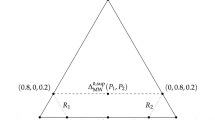Summary
It is known that the problem of combining a number of expert probability evaluations is frequently solved with additive or multiplicative rules. In this paper we try to show, with the help of a behavioural model, that the additive rule (or linear pooling) derives from the application of Bayesian reasoning. In another occasion we will discuss the multiplicative rule.
Similar content being viewed by others
References
Morris, P. A. (1983). An Axiomatic Approach to Expert Resolution.Management Sc., Vol. 29, N. 1, 24–32.
Genest, C. &Zidek, J. V. (1986). Combining probability distributions: A critique and an annoted bibliography.Statistical Sc., Vol. 1, 114–135.
Morris, P. A. (1986). Observations on Expert Aggregation.Management Sc., Vol. 32, N. 3, 321–328.
Lindley, D. V. (1986). Another Look at an Axiomatic Approach to Expert Resolution.Management Sc., Vol. 32, N. 3, 303–306.
Author information
Authors and Affiliations
Additional information
Research supported by C.N.R. and Ministry of University and Technological and Scientific Research.
Rights and permissions
About this article
Cite this article
Di Bacco, M., Mocellin, V. A Bayesian justification for the linear pooling of opinions. J. It. Statist. Soc. 1, 325–334 (1992). https://doi.org/10.1007/BF02589084
Issue Date:
DOI: https://doi.org/10.1007/BF02589084



